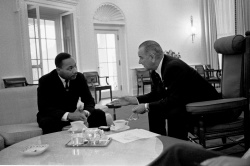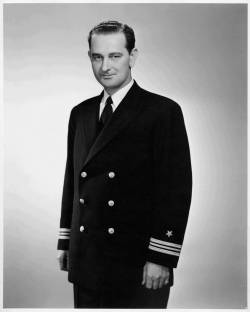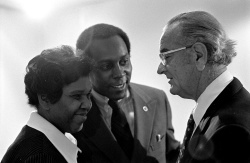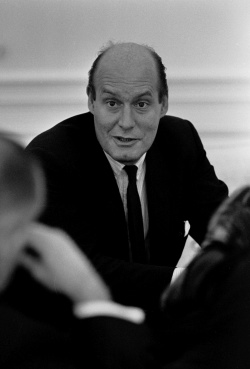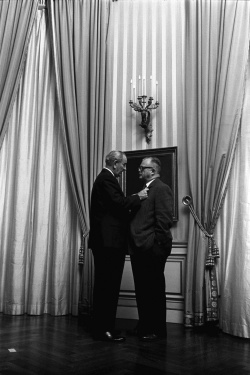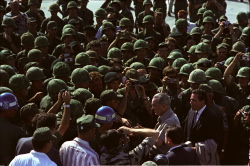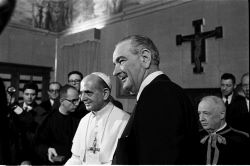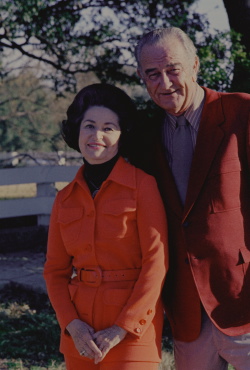1st2nd3rd4th5th6th7th8th9th10th11th12th13th14th15th16th17th18th19th20th21st22nd23rd24th25th26th27th28th29th30th31st
December 1st
On this day in 1964, President Johnson made remarks at a luncheon for the U.S. Olympic Medal Winners.
“The American people are very proud of their 1964 Olympic team. They are proud of what you have accomplished and, what is more important, they are proud of what you are.
“You have symbolized for all of us Americans what taking part—a genuine, dedicated, all-out taking part—can produce, and we salute you with a pride that carries the fullest measure of American gratitude for all the people who are privileged to be citizens of the same country that you claim.”
On this day in 1971, LBJ was interviewed by CBS News anchor, Walter Cronkite, at the LBJ Library and Museum.
December 2nd
On this day in 1964, President Johnson made remarks at the Ground-Breaking Ceremony for the John F. Kennedy Center for the Performing Arts.
“This center will reflect the finest artistic achievements of our time. It is our hope that it will house the leading artists and performers. Almost every industrialized nation in the world, on both sides of the Iron Curtain, has one or more national centers for the arts. Washington has lagged behind. Far too often, American actors and singers and musicians must travel to foreign countries to even be heard. Now, because of President Kennedy’s leadership and your efforts, they will have a stage here in the Capital of their own country.”
On this day in 1964, President Johnson met with President Kenneth David Kaunda of Zambia at the White House.
December 3rd
On this day in 1963, President Johnson met with the Rev.Martin Luther King, Jr. about civil rights issues in the Oval Office of the White House.
On this day in 1968, President Johnson presented the Harmon International Aviator’s Trophy to Maj. William J. “Pete” Knight, USAF.
Major Knight was awarded the 1968 Harmon International Aviator’s Trophy for piloting an X-15A-2 rocket plane on several flights at about 5 times the speed of sound. The flights yielded basic research data applicable to the design of future hypersonic passenger aircraft and contributed significantly to U.S. aeronautical research programs.
The Harmon International Aviation Trophies, named for the late Col. Clifford B. Harmon, pioneer American aviator, were awarded by the Clifford B. Harmon Trust and presented annually to the world’s outstanding aviators for exceptional feats of individual piloting skill.
December 4th
On this day in 1966, President Johnson had a telephone conversation with the author, John Steinbeck. The conversation took place when the President was at the LBJ Ranch.
The two men talked about the trip Steinbeck and his wife, Elaine, were about to take to Vietnam, and about Steinbeck’s sons’ military service. Steinbeck asked about signs of progress in Vietnam. LBJ told Steinbeck to be careful on his trip and to meet with him after he returned.
On this day in 1968, President Johnson made remarks at the final meeting of the President’s Commission for the Observance of Human Rights Year 1968.
“Well, officially 1968 has been designated as Human Rights Year by the General Assembly of the United Nations. Officially, this is the 20th anniversary of the issuance of the Universal Declaration of Human Rights.
“But putting aside official justification, Americans truly and personally identify with human rights as few nations in history ever have.
“We were born as a nation on a declaration of political rights which also stated universal and timeless ideals that we believe apply to all men, in all places, at all times—life, liberty, and happiness.
…
“We must do everything that we can, therefore, to help restore a sense of community, a sense of belonging, and a sense of respect, so as to make real the ultimate human right which is really respect for life itself.”
On this day in 1967, President Johnson signed the Mental Retardation Amendments of 1967.
“Retardation may afflict a child not only before he is born, but afterwards. It may be a blow of nature or it may be the result of countless human blows. In either event, the Nation suffers as the child suffers and, of course, as his family bears an unbearable burden. In either event, I think it is clearly the obligation of the Nation to act to relieve this suffering. It is our obligation to do more than we are doing.
“That is the point I want to make. We are not doing enough. We must do more. We are going to do more.
“So, today we have come here to begin an effort to care for some of those who have suffered most grievously. Our goal is a society where children born with a chance for a full life shall truly have it. This is another step in that platform that we are building.”
December 5th
On this day in 1963, President Johnson announced that he had made an agreement with House Speaker John W. McCormack on temporary succession to the Presidency in the event that LBJ became disabled.
On this day in 1968, President Johnson began a two-day meeting with Prime Minister Amir Abbas Hoveyda of Iran at the White House.
December 6th
On this day in 1965, President Johnson made a statement in response to the Federal Power Commission Report on the Northeastern Electric Power Blackout.
“In a brief instant on November 9, 1965, 30 million Americans were suddenly plunged into darkness. Nothing has so vividly demonstrated our increasing dependence on an uninterrupted flow of electric power as the blackout which then descended upon the great cities of the Northeastern United States.
“With the help of experts from American and Canadian power companies, the Commission has now completed the first phase of the investigation I requested. Its findings and recommendations are contained in the report issued today.
…
“We also know that steps can be taken to prevent such failures. Many of the Commission’s initial recommendations are already being implemented by the power companies. This effort must be continued until we have so perfected our power systems that widespread power failures will be not only improbable but impossible.
“The lights that failed on November 9, 1965, will then be remembered not as a calamity, but as the beginning of renewed efforts to further perfect what is already the world’s greatest and most efficient electrical system.”
December 7th
On this day in 1963, The Johnson family moved into the White House. The President held his first news conference.
On this day in 1964, President Johnson began a two-day meeting with Prime Minister Harold Wilson of Great Britain at the White House.
December 8th
On this day in 1962, on a boating trip at the LBJ Ranch, the Vice President’s boat’s battery died and it was towed in by Secret Service.
On this day in 1966, President Johnson announced an agreement on an Outer Space Treaty.
“In the expectation that formal U.N. action will have been completed at an early date, I plan to present the treaty to the Senate for advice and consent at the next session of Congress and I hope that the United States will be one of the first countries to ratify it.”
The treaty was signed in Washington on January 27, 1967, by representatives of 60 nations and was favorably considered by the Senate on April 25, 1967.
December 9th
On this day in 1941, Johnson reported for active duty in the U.S. Navy. While he served overseas, Lady Bird Johnson ran the Congressional office. Johnson was later awarded the Silver Star for his service during World War II.
On this day in 1968, President Johnson made a toast and gave responses at a dinner honoring members of the Space Program.
Attending the program were: James E. Webb, former National Aeronautics and Space Administrator, who retired in October 1968; Mrs. Webb; the 23 Apollo astronauts; Vice President Hubert H. Humphrey; Mrs. Humphrey; Clark M. Clifford, Secretary of Defense; Mrs. Clifford; and Representative Olin E. Teague of Texas, Chairman of the House Committee on Veterans’ Affairs and member of the House Committee on Science and Astronautics.
During this toast, Johnson stated,
“Among you, you hold records that have now become legends—most missions in space, most man-hours in space, flights that are the highest, the longest, and the toughest that any men have ever made. And these are all testimony to your courage and to your professional skill, to your Nation’s vision, and to its technology and its determination. And they are a testament to the ability of the man who has directed your efforts so long and so well.”
He also awarded Mr. Webb the Presidential Medal of Freedom—the highest civilian honor that a President can bestow on any individual whose work advances a great cause.
December 10th
On this day in 1963, upon passage of the Higher Education Facilities Bill, President Johnson commended the United States Congress as the “Education Congress of 1963.”
On this day in 1971, LBJ assisted Mrs. Johnson at a tree planting ceremony inaugurating Austin’s “Town Lake Beautification” program.
On this day in 1968, President Johnson met with H. E. Lee Kuan Yew, Prime Minister of Singapore, at the White House.
December 11th
On this day in 1963, President Johnson instructed Cabinet officers to hold civilian employees in the Government below 1964 and 1963 budget levels and to make further savings.
“I intend to disapprove any budget request for more personnel except where the facts leave me no choice," the President said in a statement to the Cabinet.
Earlier, the President went to the Pentagon to address military and civilian officials of the Defense Department, stressing that the department was responsible for half the national budget and as a result must make “the largest effort and achieve the biggest savings.”
On this day in 1963, President Johnson sent a letter to the Senate and House Committee Chairmen on renaming the National Cultural Center in honor of President John Kennedy.
It seems to me that a center for the performing arts on the beautiful site selected would be one of the most appropriate memorials that a grateful nation could establish to honor a man who had such deep and abiding convictions about the importance of cultural activities in our national life. In this connection it is my understanding that the Kennedy family would prefer to have the Center named “The John F. Kennedy Center for the Performing Arts” in order to indicate more specifically the nature of the memorial to him.
On this day in 1968, President Johnson met with H. H. Shaikh Sabah Al-Salim Al-Sabah, the Amir of Kuwait, at the White House.
December 12th
On this day in 1972, LBJ made his last appearance at the LBJ Library and Museum for the Civil Rights Symposium.
On this day in 1964, President Johnson made remarks to members of VISTA (Volunteers in Service to America).
“I want to welcome you here today, the first frontline volunteers in our war against poverty. You have come from every part of this country, from every age group, from every background. You have come to serve the poor and the unfortunate of American society, and to open the door of American opportunity to all of our American people.
“Your pay will be low; the conditions of your labor will often be difficult. But you will have the satisfaction of leading a great national effort, and you will have the ultimate reward which comes to those who serve their Nation and who serve their fellow man.”
December 13th
On this day in 1967, President Johnson signed a bill amending the Federal Credit Union Act.
“The bill that I sign today, we think, strengthens our Federal credit unions. It allows them to:
“Lend money more easily
“Pay dividends twice as often, and
“It allows them to pay dividends for a whole month on deposits received during the first 10 days of the month.
“A credit union can be another weapon in the war on poverty.”
On this day in 1968, President Johnson traveled to El Paso, Texas, to attend the inauguration of the new river channel completing the Chamizal Boundary Change.
December 14th
On this day in 1964, President Johnson had a telephone conversation with Attorney General Nicholas Katzenbach.
The two men discussed the Voting Rights bill, ways to improve voter registration, and a possible constitutional amendment. LBJ talked about setting a goal of 100% voting.
On this day in 1967, President Johnson signed a bill amending the Flammable Fabrics Act.
“This law does not blacklist anyone. It won’t put any reputable firm out of business. It will protect the honest manufacturer. But it will protect him from unscrupulous manufacturers and unscrupulous competition.”
On this day in 1965, President Johnson began a two-day meeting with President Ayub Khan of Pakistan at the White House.
December 15th
On this day in 1967, President Johnson signed an act that extended the civil rights commission for five years. This was the only civil rights legislation passed during 1967.
On this day in 1965, President Johnson sent a telegram to James Webb, Administrator, NASA, following the meeting in space of Gemini 6 and 7.
“I want to congratulate the astronauts and the thousands of scientists, technicians, and administrators for the success of today’s rendezvous. You have all moved us one step higher on the stairway to the moon. By conducting this adventure for all the world to see, you have reaffirmed our faith in a free and open society. We invite those throughout the world who have shared our suspense and suffered with us during our temporary failures to share with us this triumph, for it belongs not just to the United States but to all mankind. Our efforts in space will take us not only to the moon but, by increasing our knowledge of technology and the world around us, to a better life for all.”
December 16th
On this day in 1963, President Johnson approved the Higher Education Facilities Act (PL 88-204) which authorized a five-year program of federal grants and loans for construction or improvement of public and private higher education academic facilities.
This was the first large education program enacted by Congress since the National Defense Education Act of 1958, and it was the first broad education bill enacted in the post-world War II period that was not tied to national defense. It included funding for:
- College classrooms
- 25-30 new public/community colleges per year
- Construction of technical institutes for trained manpower
- Graduate schools and facilities in 10-20 academic centers
- Improvement of public libraries in universities and colleges
- An increase in the number of medical school graduates
- Expansion of the student loan program
- Expanded Federal/State vocational aid
- Training personnel to train and teach handicapped children
- Expanded programs for science, math, and foreign languages
- Assistance for schools with federal personnel
- Public libraries across the country
On this day in 1965, President Johnson began a two-day meeting with Prime Minister Harold Wilson of Great Britain at the White House.
December 17th
On this day in 1963, President Johnson signed the Air Pollution Bill known as the Clean Air Act.
“It will make possible a national effort to control air pollution, a serious and growing threat to both our health and our safety. Ninety percent of the population of our cities, over 100 million people, already suffer from a degree of air pollution that demands immediate action.
“There are over 6,000 communities which need assistance. This act will permit expanded research, foster cooperative efforts among the States, provide better State and Federal control over pollution. The Federal Government will encourage industry to seek effective solutions to problems of pollution and organize cooperative projects with local, State, and Federal participation.”
December 18th
On this day in 1963, President Johnson signed the Vocational Education Act (PL 88-210) which provided the extension, improvement, and development of vocational education programs, and the revision of part-time work for needy youths participating in the program. Persons of all ages would have ready access to vocational training or retraining.
December 19th
On this day in 1963, President Johnson signed the Manpower Development and Training Act Amendments, which extended manpower development and training programs. The MDTA Amendments strengthened, expanded, and extended the program to deal more effectively with the hard core unemployment problems of the unskilled and inadequately educated teenagers and older workers.
December 20th
On this day in 1963, President Johnson wrote a message on the occasion of the Launching of the Nuclear Submarine Sam Rayburn.
Speaker Rayburn was dedicated to peace, freedom, and the integrity of the individual. And we do ourselves honor when we walk in his footsteps.
We are today dedicating in his name a vessel which has been made possible by the knowledge gleaned by modern science and which will enter the service of our country. It is the fulfillment of the dedicated work of the Americans who conceived it and the Americans who built it.
To all who have participated in this enterprise and to the men who will command the Sam Rayburn, Godspeed! Your country thanks you and wishes you well.
On this day in 1965, President Johnson began a two-day meeting with Chancellor Ludwig Erhard of Germany at the White House.
December 21st
On this day in 1966, President Johnson had a telephone conversation with Secretary of State Dean Rusk. The conversation occurred when the President was at the LBJ Ranch.
LBJ complained to Rusk about the Democratic Governors with whom he had met that day; the Governors had had concerns about the poverty program, patronage, and civil rights. Rusk reported on questions he had received at a press conference.
On this day in 1961, Vice President Johnson attended Nita Louise Kellam’s wedding in Austin.
On this day in 1963, President Johnson wrote a memorandum establishing the Committee on the Economic Impact of Defense and Disarmament.
The Committee will be responsible for the review and coordination of activities in the various departments and agencies designed to improve our understanding of the economic impact of defense expenditures and of changes either in the composition or in the total level of such expenditures.
Federal outlays for defense are of such magnitude that they inevitably have major economic significance. In certain regions of the Nation and in certain communities they provide a significant share of total employment and income. It is therefore important that we improve our knowledge of the economic impacts of such spending, so that appropriate actions can be taken—in cooperation with State and local governments, private industry and labor—to minimize potential disturbances which may arise from changes in the level and pattern of defense outlays.
On this day in 1968, President Johnson wrote a message to the Apollo 8 Astronauts at the beginning of their flight to the moon.
CONGRATULATIONS on the magnificent beginning of the Apollo 8 adventure. The visions of the past are coming closer and closer to becoming the amazing achievements of the present.
I am confident that the world’s finest equipment will strive to match the courage of our astronauts. If it does that, a successful mission is assured. Prudence is a handmaiden of courage, however, so we must give top priority to astronaut safety as decisions are made each step of the way.
The message was addressed to Col. Frank Borman, USAF; Capt. James A. Lovell, Jr., USN; and Maj. William A. Anders, USAF, the Apollo 8 astronauts, who were beginning the 6-day space flight which would take them into lunar orbit.
December 22nd
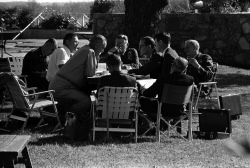 Pres. Lyndon B. Johnson meeting with Joint Chiefs of Staff around picnic table on LBJ Ranch front lawn.
Pres. Lyndon B. Johnson meeting with Joint Chiefs of Staff around picnic table on LBJ Ranch front lawn.credit: Yoichi Okamoto
On this day in 1964, President Johnson met with the Joint Chiefs of Staff at the LBJ Ranch front lawn for discussions about Vietnam.
On this day in 1963, President Johnson made remarks at a Candlelight Memorial Service for President Kennedy and the Lighting of the Nation’s Christmas Tree.
“So let us here on this Christmas night determine that John Kennedy did not live or die in vain, that this Nation under God shall have a new birth of freedom, and that we may achieve in our time and for all time the ancient vision of peace on earth, good will toward all men.”
On this day in 1968, President Johnson made a statement on the release of the crew of the U.S.S Pueblo.
"I am deeply gratified that after a long 11 months of totally unjustified detention by the North Koreans, the crew of the U.S.S. Pueblo have been freed. They should be reunited with their families in time for Christmas and I am happy for them that their time of ordeal ends on a note of joy.
“I want to pay tribute also to the patience and courage of these relatives while their husbands, fathers, and sons were held by the North Koreans.”
December 23rd
On this day in 1967, President Johnson flew to Cam Ranh Bay, Vietnam, where he addressed Senior Unit Commanders, visited wounded soldiers, reviewed troops, awarded decorations to a number of men, and addressed the troops.
On this day in 1967, after meeting with the President of Pakistan in Karachi, Pakistan and then, the President and Foreign Minister of Italy in Rome, Italy, President Johnson went by helicopter to Vatican City where he met with Pope Paul VI in the Pope’s private office. Pope Paul VI gave the President a painting of “The Nativity.”
President Johnson made remarks following his meeting with Pope Paul VI.
"We discussed possible paths to peace, and the efforts that have been made in recent years, so far without success.
“We agree with His Holiness that ‘an honorable settlement of the painful and threatening dispute is still possible.’ I received his judgment to this end, and I deeply appreciate the full and free manner in which it was given.
“His Holiness has suggested a principle of mutual restraint. If this principle were accepted by both sides, there would be rapid and solid progress toward peace.
“We would be willing to stop the bombing and proceed promptly to serious and productive discussions.
“A total end to the violence would be our urgent objective.
“We support informal talks with the South.
“We are ready for formal talks with the North.
“We will agree to any proposal that would substitute the word and the vote for the knife and the grenade in bringing honorable peace to Vietnam.
“We shall keep closely in touch with His Holiness in the days ahead, as we shall with others who are searching to lift the scourge of war from Vietnam and Southeast Asia."
December 24th
On this day in 1967, President Johnson gave a Christmas Message to the Nation upon returning from his Round-the-World Trip.
“Now that the holy day itself has come, I wish each of you a full measure of happiness. I hope that all of you may remember, this Christmas, the brave young men who celebrate the holy season far from their homes, some in trailers, some in rice paddies and foxholes, but all of them serving their country—serving their loved ones—serving each of us.
“I hope, too, that your hearts may be filled with peace within, as your country so earnestly seeks peace in the world.
“Our country has known many wartime Christmases. It may seem difficult, at such times, to even say ‘Merry Christmas.’ But when you think of the bravery of the human spirit, and the compassion of the human heart, and the power of life to triumph over pain and darkness, you are properly thankful. Your own spirits are lifted higher; and you say it—and mean it—as I do now. Merry Christmas.”
The President’s message was recorded in the White House Theater for national broadcast.
December 25th
On this day in 1963, President Johnson wrote a Memorandum on Control of Federal Employment to the Heads of Departments and Agencies.
When I approve new targets for your agency, you will put them into effect and make strenuous efforts to achieve them through tighter management, redeployment of personnel, simplification of procedures, and stripping work to essentials.
(Dated December 24, but released on December 25)
December 26th
On this day in 1963, President Johnson appointed a committee to review foreign aid programs.
December 27th
On this day in 1968, President Johnson was honored for his contributions in the field of education. He spoke to educational leaders saying,
“I am so grateful to you for this very generous and very thoughtful act. I am not responsible for what has been done nearly as much as you people who have come here and knocked down the doors, twisted the arms, and tried to help us bring these programs to reality.”
On this day in 1968, LBJ made remarks by telephone to the Apollo 8 crew members following their return from the moon.
"You have made us very proud to be alive at this particular moment in history. You have made us feel akin to those Europeans nearly five centuries ago who heard stories of the New World for the first time. There is just no other comparison that we can make that is equal to what you have done or to what we feel.
“I had a memorandum a short time ago from the men who handle the Washington-Moscow hotline. And I thought you would be interested in a portion of that memorandum to the President.
“It said that due to the interest of the Soviets in the Apollo program, we asked them, after we heard from them on Apollo 7, if they would be interested in being informed of developments in Apollo 8. The hotline personnel in Moscow responded enthusiastically and asked us to keep them posted. So we informally, here at the hotline in Washington, relayed information in regard to the most important aspects of your flight, and the Soviets were very solicitous about the welfare of you astronauts and expressed great interest in the success of your flight.
“Now, we all know that you men were supported by an elaborate technical apparatus and by many brilliant and devoted men and women here on the ground. We salute all of them as we salute you.”
On this day in 1965, President Johnson had a telephone conversation with McGeorge Bundy, Special Assistant to the President for National Security Affairs.
They talked about a bombing halt in Vietnam, port congestion in South Vietnam, the contribution of the Philippines in Vietnam, and press leaks from the military. LBJ said he favored a halt in bombing if there was hope of peace.
December 28th
On this day in 1964, President Johnson wrote a letter to Secretary McNamara transmitting Final Report of the President’s Committee on Equal Opportunity in the Armed Forces.
The Defense Department has, I believe, done an excellent job in resolving many aspects of the general problem of discriminatory treatment of those who serve in the Nation's Armed Forces. I would hope that the momentum already achieved in moving toward the Nation's objective of equality of treatment and opportunity for all servicemen would continue until every vestige of the problem has been eliminated.
On this day in 1963, President Johnson began a two-day meeting with German Chancellor Ludwig Erhard at the LBJ Ranch.
December 29th
On this day in 1964, President Johnson issued Proclamation 3632: Regulations for Preventing Collisions at Sea.
On this day in 1964, President Johnson issued Executive Order 11190 providing for the screening of the Ready Reserve of the Armed Forces.
December 30th
On this day in 1963, President Johnson made remarks in Austin, Texas, at the dedication of the Agudas Achim Synagogue.
“On Thanksgiving Day, Mrs. Johnson and I attended a worship service in Washington. The sermon then was delivered by Rabbi Stanley Rabinowitz. The Rabbi told this story, which I have remembered so vividly ever since Thanksgiving Day. He said once, in the past, birds had no wings. They could not fly. They walked in the dust, earthbound. Then one day God threw wings at their feet and commanded them to carry the wings. At first this seemed very difficult. The burden was heavy. But in obedience to God’s will, they held the wings closely to their sides and the wings soon grew to their bodies. At last, what they once thought were hampering weights lifted them unto the heights and enabled them to soar unto the very gates of heaven.
“We cannot always do God’s purpose, but we can always try to do His will. The man who does, and the nation whose people do, have the hope of reaching new heights.
“Mr. Novy, our Constitution wisely separates church and state, separates religion and Government. But this does not mean that men of Government should divorce themselves from religion. On the contrary, a first responsibility of national leadership, as I see it, is spiritual leadership, for I deeply believe that America will prevail not because her pocketbooks are big, but because the principles of her people are strong.
“We have met a great test, and we have met it well. But I would remind you tonight that history is not through with us. Great nations must meet many tests. We shall face many more in the days to come. It is my hope, and your prayer, that the tests of the future will find us all working in brotherhood to put down the hate of the present, to prevail over evil, to work with mercy and compassion among the afflicted, to be in all that we do worthy to be called God’s children.”
On this day in 1963, President Johnson issued Proclamation 3566: American Heart Month, 1964.
December 31st
On this day in 1963, President Johnson sent a telegram to the Chairman, United Negro College Development Campaign.
Delighted with the report United Negro College Fund has raised twenty million dollars and is therefore nearly half way to completion of capital requirements. Hope you and your excellent committee will continue task begun in this Centennial Year of the Emancipation Proclamation at least through first quarter of 1964 in an all-out effort to reach the fifty million dollar goal.
The telegram was made public as part of a White House release which noted that the fund-raising campaign would benefit 32 Negro colleges.
On this day in 1966, President Johnson had a telephone conversation with Arthur Goldberg, the U.S. Ambassador to the U.N. The conversation occurred when the President was at the LBJ Ranch.
The two men talked about the U.S.S.R offer to influence Hanoi. LBJ discussed U.S. willingness to negotiate, the failure of peace efforts, the inevitability of civilian casualties during bombing, U.S. relations with the U.S.S.R., Hanoi’s continued aggression despite U.S. limitations, and China.

